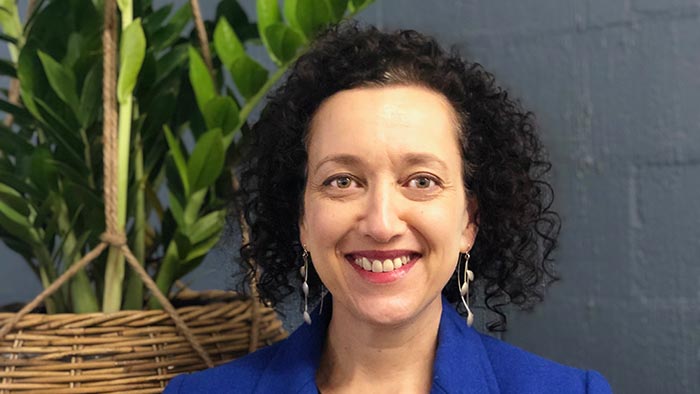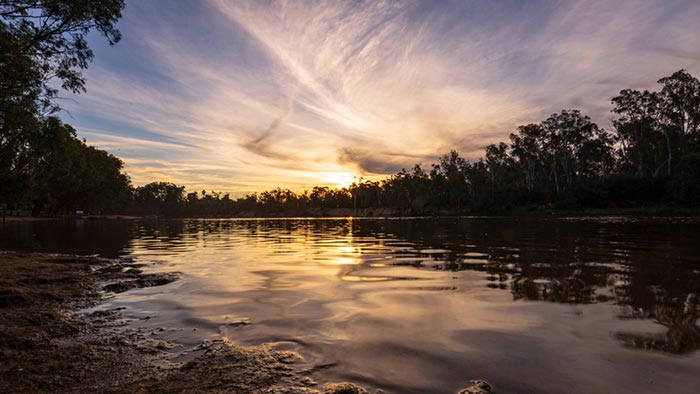Benefits flow from water collaborations
Throughout her extensive career in the Australian water sector, Dr Sharon Davis has worked to bring science and policy together to better inform decisions about water resources. With a PhD in Catchment Hydrology and more than 20 years’ experience working in state and federal public sector, Dr Davis has an intimate knowledge of both policy and science.
Now as an Enterprise Senior Fellow with Melbourne School of Engineering (MSE) Dr Davis aims to connect the University’s research expertise with the community’s evolving needs around water.

Dr Sharon Davis
Her work is part of MSE’s Water, Environment and Agriculture Program (WEAP), which targets support for government policy and technical, operational innovations.
In previous positions – as Executive Director of Water Resources with the Victorian Government, and as a General Manager within the Murray–Darling Basin Authority – Dr Davis actively worked to link scientific research with real-world outcomes. These roles also provided invaluable insight into decision-making at the highest levels of government.
By applying this insight , she is helping to fine-tune WEAP’s research priorities and strategic direction, with a keen eye on impact.
Our impact ranges from management and policy advice across entire water systems, to specific technical and engineering solutions for water managers and industry
“WEAP includes researchers spanning environmental, agricultural and urban water systems. Our impact ranges from management and policy advice across entire water systems, to specific technical and engineering solutions for water managers and industry,” she says.
As WEAP is multidisciplinary, it has the capacity to take a ‘systems approach’ to water management. Dr Davis says this means delivery of more complete products, perspectives and research projects, taking into account agricultural, urban and environmental needs.
‘Place-based’ approach
As part of this ‘systems approach’, the University of Melbourne has taken a leading role in the development of a new cooperative research centre proposal for the Murray–Darling Basin: the ONE Basin CRC.
Dr Davis says investment in water research has remained at the same level for almost 40 years. At the same time, the community’s trust in the institutions and experts managing water issues in the Murray–Darling Basin has been eroding.

Australia's Murray River
“We know for certain that the future will not look the same as the past. We need to work in collaboration to build the knowledge base and develop solutions to manage the future climate and water risks in the river system,” she says.
Place-based research is an increasing focus of WEAP’s,, working with communities, industry and government organisations in regional hubs. Community engagement is central to initiatives such as WEAP’s Mallee Regional Innovation Centre, led by Professor Michael Stewardson, working with people ‘in-place’ in the region to identify research priorities and co-design research projects. In another local initiative, Dr Davis and MSE colleague Professor QJ Wang also recently ran a forum with the Goulburn Broken Catchment Management Authority about research priorities for that region.
Increased diversity
Dr Davis says having a broader range of views and voices involved is important. “It makes me really excited working collaboratively because, we need a diversity of views to get the best possible outcome and solutions.”
Homeward Bound’s 10 year vision is to build a global network of 1000 women with STEM backgrounds to demonstrate a new model of leadership creating better outcomes for the planet
That diversity includes more women, which is why Dr Davis is committed to supporting women in STEM. She has established a Women in Water group as part of WEAP, and is also part of the international Homeward Bound Women in STEM leadership program.
Homeward Bound’s 10 year vision is to build a global network of 1000 women with STEM backgrounds to demonstrate a new model of leadership creating better outcomes for the planet. Now in its fifth year, the Homeward Bound Team 5 (#TeamHB5) is made up of 80 women including more than 25 nationalities. The ground-breaking 12-month leadership development program culminates in an 18-day intensive stay in Antarctica, which Dr Davis will participate in later this year.
Communication capacity
As an adjunct to strategy and partnership initiatives, Dr Davis is also working with MSE and its research team to build communication and engagement skills.
“While publishing papers in peer-reviewed journals is important academically, communicating the findings of our work to a broader audience is vital to adoption. To communicate more effectively with our stakeholders we need to look at platforms like The Conversation, LinkedIn and other social networks,” she says.
While publishing papers in peer-reviewed journals is important academically, communicating the findings of our work to a broader audience is vital to adoption
“And we need to think about other ways to communicate beyond the written word.” Dr Davis is helping to provide those skills through a series of hands-on training workshops run with colleagues Liz Baxter and Professor Len Sciacca, teaching researchers to communicate their research vision clearly to external audiences – and to understand the importance of doing so.
She is also building WEAP’s engagement with the water sector and broader community through the Water Security Series . These monthly seminars feature speakers from the University, industry and government, delivering engaging panel discussions.
The seminars are designed as an opportunity to create more informed discussions around important issues in the water sector. “They provide new pathways for people to access information and ask questions while increasing our active participation in the space,” Dr Davis says. “The series also builds our reputation as trusted advisors providing objective and scientifically rigorous knowledge and information.”
One thing is certain, with enhanced collaboration and information, we are ensuing the best possible solutions are available to the water management sector for now and the future.
Related topics